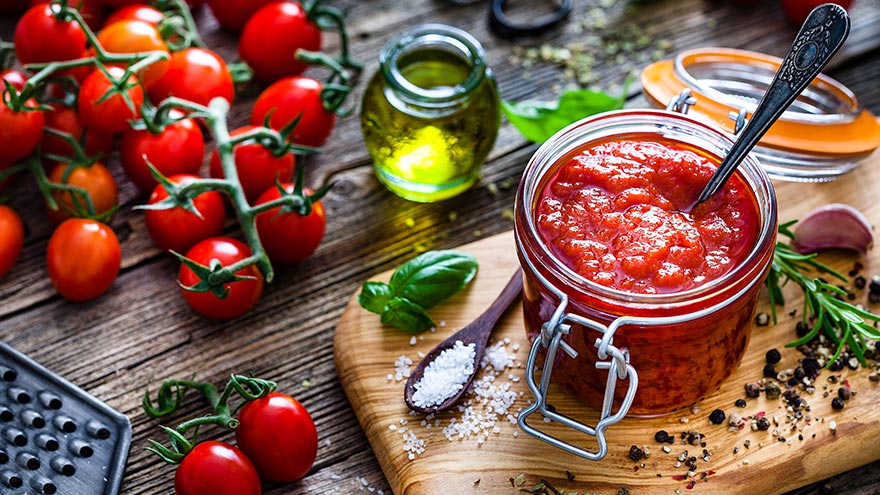Search
-
Paleo Garlic Mashed No-Tatoes
This scrumptious mashed potato substitute is super easy, tasty and gluten-free.
-
DIY Heart-Healthy Marinara Sauce
The convenience of marinara sauce in a jar is pretty hard to beat. But with some extra time in the kitchen, the nutritional value of traditional sauce — already packed with good stuff — goes off the charts.
-
Want to Eat for Heart Health? Consider a Plant-Based Diet
Maintaining a healthy weight has many benefits: among those is improved heart health. If you’re trying to eat right as well as become healthier, nutrition experts say you might want to consider a plant-based diet. Plants provide air to breathe, beauty in our surroundings — and just may be a viable solution to your weight-loss goals. According to the Centers for Disease Control and Prevention, more Americans than ever are overweight: Today, 7 in 10 Americans are classified as “obese” or “overweight,” and childhood obesity rates are growing rapidly. So experts encourage would-be dieters to look to plants as a source of daily inspiration. “When you slowly and consistently expand your daily food choices to include more plant-based options, you will feel fuller, have more energy and lose weight,” says Lynice Anderson, director of Renown’s Healthy Heart Program. But according to a recent study from the U.S. Centers for Disease Control and Prevention, just 1 in 10 adults eats enough vegetables and only 12 percent get the recommended amount of fruit daily. The same study notes that eating a diet rich in fruits and vegetables daily can help reduce the risk of many leading causes of illness and death, including heart disease, type 2 diabetes, some cancers and obesity. Plant Foods = Foods with Fiber One of the overwhelming health benefits of plant-based foods: fiber. A study published in a recent issue of the Annals of Internal Medicine suggests that something as simple as aiming to eat 30 grams of fiber each day can help you lose weight, lower your blood pressure and improve your body’s response to insulin just as effectively as a more complicated diet. Fiber contains no calories and comes in two forms: soluble, which dissolves in water, and insoluble, which doesn’t dissolve. Both are important for different reasons. The soluble fiber found in oats, fruits and beans forms a gel-like substance and helps to lower blood cholesterol and blood sugar levels. Insoluble fiber found in fruit skins, green beans and cauliflower goes through your intestines relatively intact providing “bulk” and improving bowel-related health problems. “My fiber champion is chickpeas, also known as garbanzo beans,” says Renown Chef Chris Wyatt. “They are high in fiber, low in fat, low sodium and have zero cholesterol. Not only do they not contain any cholesterol, chickpeas work to remove cholesterol from your body. It’s a win-win.” Snacks That Are Part of a Plant-Based Diet Looking for the best sources of fiber from the plants and trees in your life? Here are the best options, according to this CDC fact sheet: Fruits Raspberries, 1 cup: 8.0 grams of fiber Pear, with skin, 1 medium: 5.5 grams of fiber Apple, with skin, 1 medium: 4.4 grams of fiber Strawberries (halved), 1 1⁄4 cup: 3.8 grams of fiber Banana, 1 medium: 3.1 grams of fiber Orange, 1 medium: 3.1 grams of fiber Veggies Artichoke, cooked, 1 medium: 10.3 grams of fiber Peas, cooked, 1 cup: 8.8 grams of fiber Broccoli, boiled, 1 cup: 5.1 grams of fiber Turnip greens, boiled, 1 cup: 5.0 grams of fiber Sweet corn, cooked, 1 cup: 4.2 grams of fiber Brussels sprouts, cooked, 1 cup: 4.1 grams of fiber Potato; with skin, baked, 1 medium: 2.9 grams of fiber Carrot, raw, 1 medium: 1.7 grams of fiber Renown Health Improvement Programs | Appointments: 775-982-5073 Renown Health offers a number of educational and support programs to help people overcome the challenges presented through various health conditions and to aid in creating and adopting a healthy lifestyle. To get an assessment of your dietary needs, schedule a consultation with one of Renown’s registered dietitians, who can help with: Diabetes Programs Medical Weight Management Nutrition Programs Make an Appointment
Read More About Want to Eat for Heart Health? Consider a Plant-Based Diet
-
Dry Weather and Your Health – What to Know
Dry weather – as northern Nevadans we know it well. Of course this doesn’t mean we’re not affected by its health impact whether you’re new to the area or are a native. Stephanie Stutz, DO, a Renown Medical Group doctor specializing in family medicine, explains how to live comfortably in the high desert. Have you noticed dry skin, itchy eyes or more bloody noses? If you call northern Nevada home, you’re probably no stranger to these problems. “We get a lot of questions from people wanting to know, ‘what can I do to prevent things from happening from the dry weather?’” says Dr. Stutz. “We do have a dry climate, and obviously in the summertime you notice it more than in the winter, so we look at things like dry skin, dry eyes and dry nose.” It generally takes about two weeks to become used to the change in climate. Dry Weather Health Tips Fortunately, there are some easy things you can do to reduce your discomfort in dry weather. Dry skin. “If you have dry skin, use a lotion without perfumes so it won’t increase the potential for drying your skin out,” recommends Dr. Stutz. For example, one home remedy for extremely dry skin (or for those with thinner skin) is cocoa butter. “It’s thicker so it goes under the skin and takes more time to absorb. As a result, you get a much more long-lasting effect.” Dr. Stutz adds. “You can also add lavender essential oil to your cocoa butter to help you sleep at night.” Dry and itchy eyes. “Use eye drops on a regular basis and keep them with you. I recommend people have a couple of bottles – one at home and one in their bag,” Dr. Stutz suggests. Dry nose. “Overall one of the best things to use is a simple nasal wash,” she says. “You can get it over the counter; it’s a saline nasal wash. Use it a couple of times each day and it can be extremely helpful. In particular, gets up into the sinuses and clears them of any pollen or residue in there.” Dry Weather Nosebleed Advice In our dry climate, you may also notice more allergies and nosebleeds. Dr. Stutz cautions, “Surely the dry air can make your allergies much worse. It can create much more irritation, pain and pressure, particularly in the nose and sinuses.” Again, Dr. Stutz recommends using a nasal wash to remove discomfort. Using a nasal wash two to three times a day can also help prevent nosebleeds. “And if you’re someone who has severe or chronic nosebleeds, you can put a little bit of Vaseline along the inside of your nose to create a moisture barrier”. Dry Weather Medication Advice In addition to allergy and nosebleed sufferers, people on certain medications may be at greater risk for symptoms in our dry climate. “The medications you are on can make you much more susceptible to drying out and becoming slightly dehydrated,” Dr. Stutz warns. For this reason discuss all of your medications with your doctor. Specifically, see if you can time them throughout the day or look at changing the dosage. Should I Get a Humidifier? Given our year-round dry weather, you may want to purchase a humidifier to help ease your symptoms. But there are some things you should know first. “You have to be careful with humidifiers as there are pros and cons,” states Dr. Stutz. “The small tabletop humidifiers are not beneficial. You need to get one covering a huge amount of square footage and holding approximately 10 to 30 gallons of water to help your home. On the negative side, if you’re not maintaining it on a regular basis, it will hold on to mold and other allergens. So the next time you turn it on, you’re actually putting that back into the air.” Do I Need to Go to the Doctor? To be sure, it’s important to know yourself and your family. If this is something you experience each year, you can try over-the-counter medications. “But remember, there’s always the caution if you’re on prescription medications,” Dr. Stutz explains. “If you are on chronic prescriptions, come in to get evaluated just to make sure you’re not using anything which interferes with your medications.” Not Just a Summer Problem As the temperatures drop, remember this isn’t just a seasonal issue here in the Reno-Tahoe area. During the winter months, our dry climate combined with cold temperatures and heaters can still cause dry skin, aggravated sinuses and even itchy eyes. So use these helpful dry weather tips all year. Comprehensive Primary Care Renown Medical Group primary care physicians provide comprehensive primary care by appointment. Doctors coordinate each patient’s medical care including checkups, immunizations, referrals to specialists, lab work, X-ray & imaging and hospital admissions. Find a Doctor
-
Top 3 Cholesterol Questions Answered
With more than 29 million adult Americans having high cholesterol, it’s important to know the facts. We asked Jayson Morgan, MD, a cardiologist with Renown Institute for Heart and Vascular Health, explains the numbers, the risk factors and how to maintain healthy levels. What is cholesterol? There are two types: Low-density lipoprotein (LDL) cholesterol, also known as the “bad” variety, because it can eventually build up within the walls of your blood vessels and narrow the passageways. High-density lipoprotein (HDL), also known as the “good” variety, because it helps remove other forms of cholesterol from the bloodstream. In adults, total cholesterol is considered high if it is more than 200 mg/dL. If the total is more than 200 or if high-density lipoprotein (HDL) levels are less than 40, your heart and brain may not be getting as much oxygen-rich blood as they need. This puts you at greater risk of heart attack and stroke. HDL levels greater than 60 mg/dL can actually lower your risk. What are the risk factors for high levels? Diet high in saturated fat Excess body weight Lack of exercise Smoking Family history Age (as people age, they are more prone to high levels) How often should someone get their numbers checked, and what kind of test is done? The American Heart Association recommends all adults age 20 or older have their cholesterol checked every four to six years. Those with cardiovascular disease or who are at higher risk of it may need their levels and other risk factors assessed more often. Your primary care provider can perform the test, along with assessing your other risk factors to help determine a treatment plan if necessary. The test will likely be one you will need to fast for, meaning no food, beverages or medications for around nine to 12 hours. Your healthcare provider will let you know if, and for how long, to fast. A simple blood test is all that’s needed to get your levels. What are some ways to lower “bad” cholesterol and raise “good” cholesterol? To achieve healthier levels, people should: Eat a heart-healthy diet: Choose healthier fats, eliminate trans fats, eat foods rich in omega-3 fatty acids and increase soluble fiber. Increase physical activity: Exercise on most days of the week. Quit smoking: If you smoke, it’s time to stop. Quitting smoking will improve HDL “good” cholesterol levels. Lose weight: Losing as little as five to 10 percent of your weight can improve cholesterol levels. Drink alcohol only in moderation. And finally, if lifestyle changes aren’t enough, your care provider might recommend medication to help lower your numbers. Renown Institute for Heart & Vascular Health For optimal heart health, the American Heart Association encourages you to “Know Your Numbers” which include: blood pressure, body mass index (BMI), cholesterol and fasting blood sugar, by scheduling a visit with your doctor. These numbers are critical in assessing your current risk for heart disease and stroke. Find a Cardiologist
-
Make Hydration a Priority for Your Health
As the temperatures skyrocket and we return to more outdoor activity, one thing is certain: you must hydrate to stay cool, healthy, and functional. But how much water do you need, and what are some easy ways to ensure you are getting enough? Aurosis Reddy, DO a family medicine provider with Renown Medical Group, shares what you need to know. How Much Water Is Enough? Experts agree that recommended daily water intake can vary depending on different factors such as your weight, metabolism, location, diet, physical activity, and health. As a rule of thumb, women should aim for a daily fluid intake of 91 ounces, and men should aim for 125 ounces. It is important to listen to your body and recognize when you might need to increase your water intake. For example, if you’re partaking in strenuous exercise, or spending time outside in the heat, you’ll want to give your body more water and electrolytes to function properly. How Can I Tell If I Am Dehydrated? Decreased coordination Fatigue Less urination Dizziness Dry, sticky lips and mouth Increased thirst Headache





